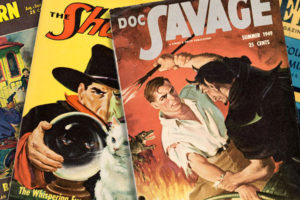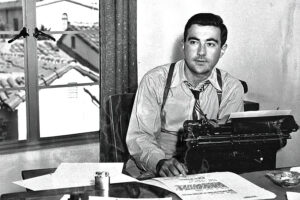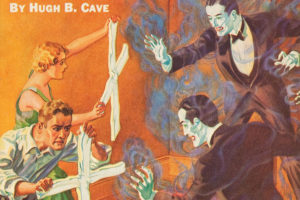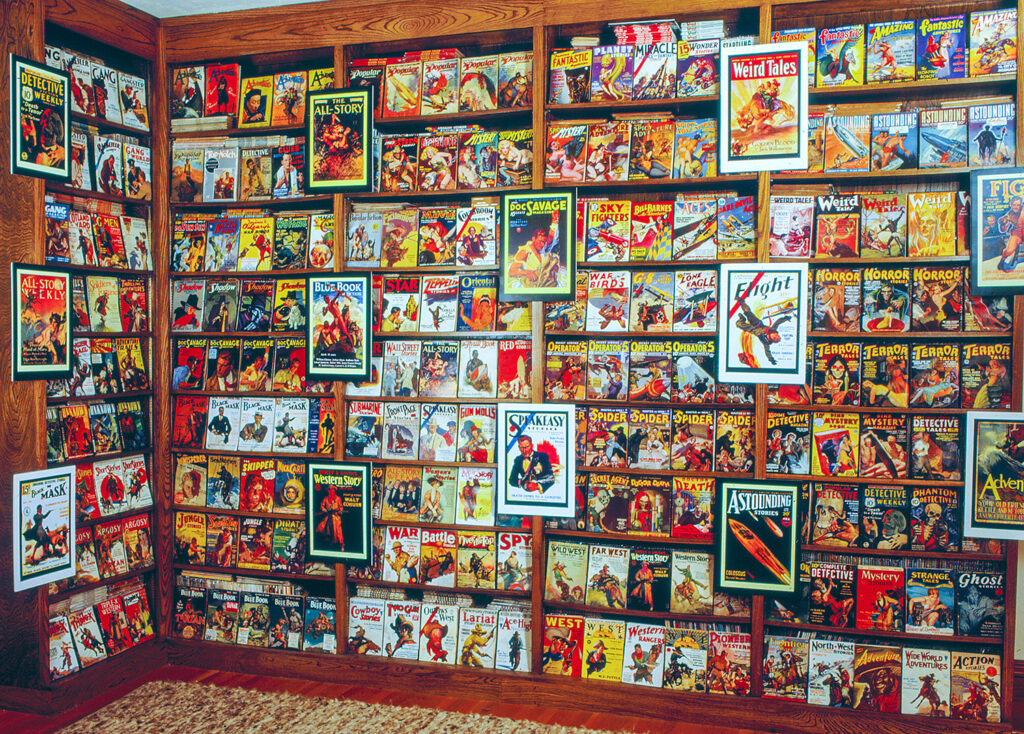
Planning ahead will ensure that your pulp treasures won’t be squandered after you’re gone.
Donating (my collection) to a public institution, or forming a private foundation for them (as some other collectors have done recently) was never considered. A greater gift to future generations would be to give them the thrill of the chase, the excitement at the moment of capture, the privilege of owning such great books, the intriguing study of their printing, decoration, binding, and provenance. The present sales may give them this opportunity.
— Robert Hoe III (1839-1909)
famous 19th-century book collector
This article may not be everyone’s cup of tea. You see it’s basically about death — yours, mine, all of ours.
Many people are squeamish about such subject matter, and you may already be thinking about turning the page and finding a different (more sedate) article to read. Try not to, though. What will be covered here is worth a read, could really help you better understand the disposition of your collection, and will certainly help out your loved ones in the future. And that should be important to all of us.
Fanzine flashback
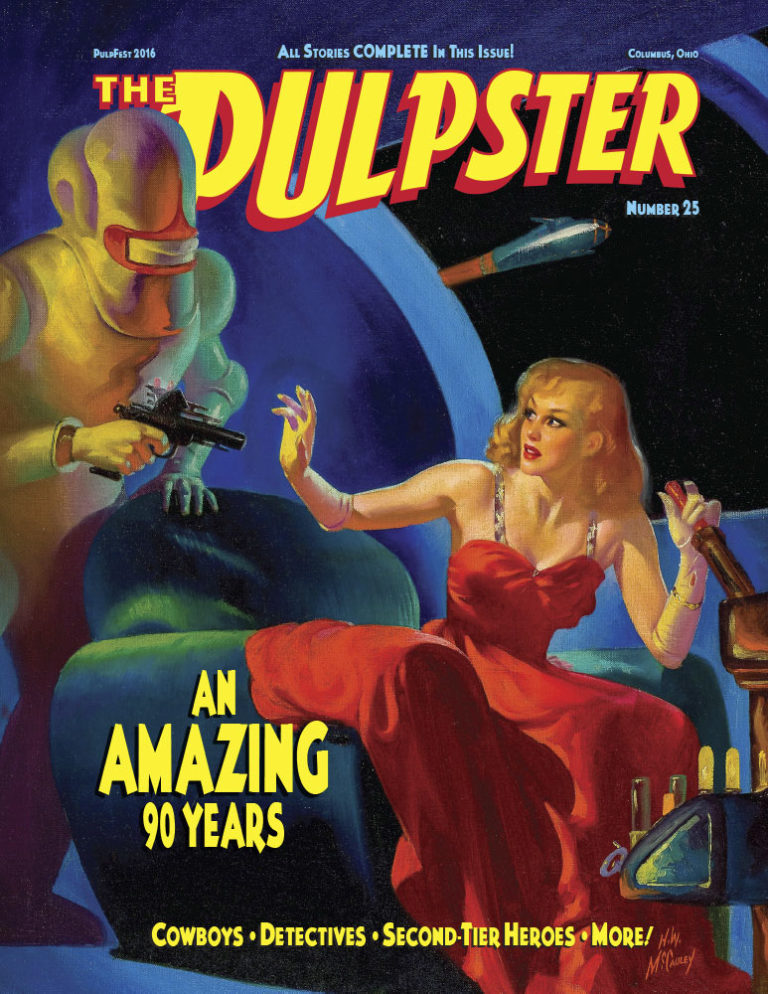
This article originally appeared in The Pulpster (No. 25; July 2016). Reprinted by permission. Copyright 2016 by David W. Smith.
My wife is a lawyer, and I’m a part-time paralegal. Back when we had a general practice law office, doing wills was a routine part of what we offered. I would on occasion talk to my friends about the importance of having a will (even offering them the super-duper friends-and-family discount). Funny thing though, rarely would they take us up on our offer. A few even asked for the questionnaire that started the process. But they would rarely fill it out and return it to us.
I think it is almost a superstitious mind-set with many to not think about death and maybe it can be staved off: don’t think about it and it won’t come soon. It is almost as if a will instigates the death process, fear of self-fulfilled prophecy if you will.
Everybody 18 or over needs a will. You may have virtually no possessions or your collection may be worth six figures or more. Even if you have little, you still should give directions about the disposition of your items.
Let me emphasize that especially the collector needs a will — that’s us! But let me also propose that the collector would do well with a second document as well, what I call an estate manual. This second document is the actual instruction manual on how best to dispose of your collection. Knowing what to do with a collection can be complicated, especially if your executor does not know very much about collectibles and what to do with them. This is particularly true if your collection is to go to a non-collector spouse or relative who will want to sell the collection.
We all need a will
I have a friend who doesn’t have a lot of possessions, and no real estate. He’s an old-time rocker, so collectibles-wise he has some old Beatles items from the 1960s and a few vintage music-related posters. Even though you could put his whole collection into a couple of large boxes, he still needs a will.
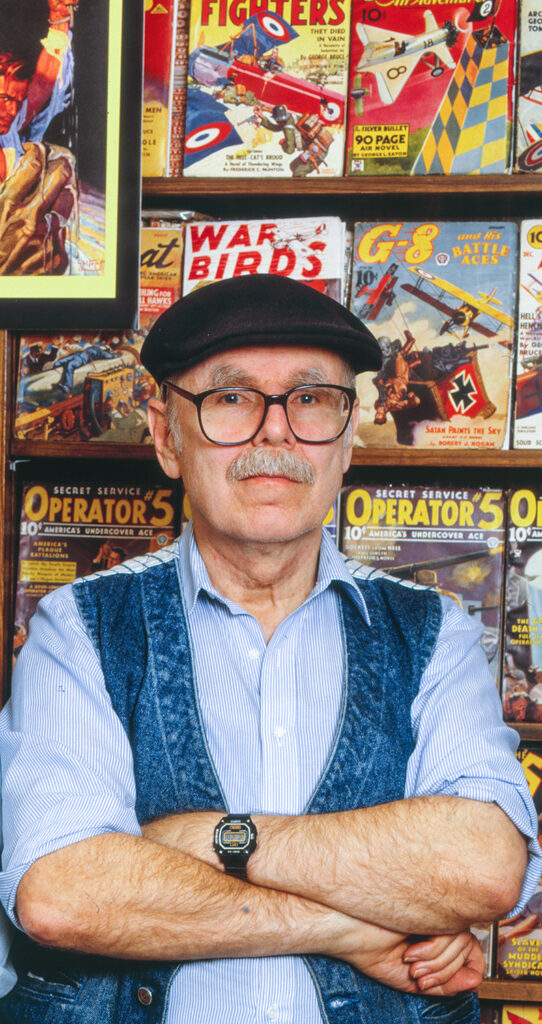
One of my clients passed away a few years ago. As he was not married and had no kids that I know of, he would have been in bad shape had he not had a will to direct where his collection should go. Fortunately, he had such an instrument in place.
Some people may rely on an oral will. Verbal information may not get shared well. This information needs to be written down, and codified based on state law. Realize that an oral will is likely not sufficient under most states’ laws. Some states, such as Washington, allow a personal-property memorandum to be added to the back of the will. This allows you to note individual pieces of property and say to whom they should go. The memorandum can be changed without rewriting your will. State laws are different, so you need to do the research yourself or hire a lawyer to do this for you. Most attorneys don’t charge much for a simple will. Really, there is no good excuse not to have one.
Before super-collector Frank M. Robinson passed away in 2014, he did the ultimate exercise in dealing with his estate. He took the initiative and sold it in 2010 via auction, thereby controlling how it would be dispersed. A wonderful catalogue was issued, which will always be a part of his collecting legacy. Fortunately, before he passed away he was able to orchestrate how and when all this would transpire. Great timing on Frank’s part.
We may not all be as fortunate as Frank, and I for one would not want to see my collection auctioned. I would like to be able to enjoy my collection till my dying day. After that my estate can take care of it. This is why I decided to write my own estate manual as instructions on how best to dispose of my collections.
The estate manual
Some people don’t care what happens to their possessions when they die. That lack of materialism is probably good. But assisting a loved one(s) who will be in mourning is an act of kindness and love. I also don’t think that simply saying in a will (or verbally) that they should just “mail everything to X and have them auction or sell it for you” is sufficient. To be good stewards of our collections we should want them to benefit our heirs or close friends. It’s important to dictate how this will play out after our collections leave our control.
In my own will I have what I term “collectibles co-executors.” The collectibles co-executors are in place to help facilitate the sale of the collection. Now, my wife is fully capable of pulling this off without too much help. The collectibles co-executors are more like advisors, and are not necessarily binding on the estate. However, if let’s say we both perish together, then the estate goes to my secondary beneficiary, which in this case would be my daughter. She doesn’t know much about the collection, so she would need help in realizing the most financial benefits from it. This is where the co-executors come into play.
Having an executor in your will who is knowledgeable about your collection is just a good idea. Assuming they are not the main beneficiary, they should be compensated for the work they do on benefit of the estate. Ten to 20 percent of the net money produced from the sale of your collection is a good rule of thumb for compensation. It could also be something out of your collection that goes to them in lieu of pay. You can work that out with them in advance.
If you have just one area of interest, you still need instructions on where it should go. It may be as simple as “send all my pulps to X auction house.” However, rarely is life so simple. In the case of the client who passed away a few years ago, he apparently willed his collection to some collector friends. This is still simple but needed to be spelled out.
What if you collect in more than one area of interest? Then it can become complicated. Using my own collection as example, I have pulps, comics, original art, vintage toys, movie memorabilia, and rare books. The books themselves can be further divided into several sub-genres. All these would not go to the same auction house. This is where my estate manual comes into play.
Selling your collection at auction
Selling a pulp-magazine collection at auction provides both you, the collector, or your heirs an alternative to selling your collection piecemeal. Here is a brief, and certainly not exhaustive, list of organizations and businesses that handle pulp auctions:
As an alternative to auction, a collector or the collector’s estate may want to consider selling directly to a pulp dealer.
While most of my collection will go to my wife, she still needs help in the disposition of it. If you’ve just passed away, then your family certainly doesn’t need the added burden of trying to figure out what to do next. Having it spelled out will be most helpful. Remember, no one will know what to do with your collection as well as you will, so writing instructions down is very important. It will help your estate immeasurable, and will also go a long ways to maximizing future profits.
Most of my rare books will probably go to Heritage Auctions. They have made wonderful inroads in the rare-book auction department. However, not all will go to them: Heritage just isn’t as adept in the vintage magic books department. My signed Houdini books will do much better at a different auction house, so I need to spell out where these go. Different auction houses will serve you better than others depending on the subject matter.
I try to follow auction-house prices realized so I have a good handle on where certain items will do best. Remember, having just one auction house may not serve you well for everything in your collection. Do your research, and figure out which is best for you and your collection. Comics, pulps, and books may go to three different venues, or they may not, but you need to figure this out. There is no one answer for everybody. You may also need to decide if your collection should go to a professional auction house or somewhere else. You may just leave it up to your collectibles executor to decide what is best based on market conditions to do with the collection after you pass.
Of course, you can take care of it yourself. Like Frank Robinson, you may want to sell most of your collection on your own as you enter your twilight years. I think this method gives you a lot of control and satisfaction over the process. A lot of people take a “lightening the load” mindset later in life. If you’re one to sell your big house in your golden years and move to a smaller one, then that may also be a good time to divest yourself of your collection.
My estate manual is not static. I didn’t just write it once and leave it as is. As my collection ebbs and flows, so does the manual. The original incarnation started out as five pages. Today it has grown to over 20 pages long, and it will continue to grow as the collection grows. I don’t rewrite it as much as I add and subtract from it as the collection changes. I may have added something important to the collection and want to address that change, or something could have happened in the marketplace that needs to be focused on. I will continue adding new paragraphs, and changing or subtracting old ones to reflect the most vital current information that I can, to make the manual as current as can be. To show you what I mean, here’s a section out of my estate manual. Remember, I am writing this for my executor to read after I pass:
Doc Savage pulps: As you know, I am trying to put together a complete set of this title. As of right now (Oct. 2006) I have about 24 issues to go. This year (2006) I acquired the first issue, so it has been a good year in that respect. Otherwise I have not added too much to the set lately, but have kept busy with other pulps and comics. The #1 is in the safe and I would value it at about $5,000.00+… The #2 is low grade and currently on the shelf with the rest of the set. It is low grade and has interior tape but would still get $500.00+ on eBay. The #3 is Canadian and I hope to upgrade it to an American copy sometime. ******** is a Doc expert and can help you with the values on the rest and what to sell vs. what to hang onto for a while. If I do complete it then it would be nice to sell as a complete set.
NOTE: As of July 2011 six issues to go.
2015 — COMPLETE! I bought ********’s set and upgraded mine so now I have a very nice set for my own. I also have a complete set for sale.
As you can see above, when I add a new paragraph I usually date it so I can see the natural progression of the manual taking place. You, on the other hand, may choose to take a different approach. You may wish to rewrite it as your collection changes, or you may decide to sit down with it once a year and do the changes.
There is certainly no hard-and-fast rule on how to do it. What works for you is best. The point is to create some tool to help your estate dispose of your collection in the best possible way. Also, it’s important to keep the estate manual with your will and even reference it in your will.
An important concept
Now here’s what may very well be the most important part of this article. While it’s important to state where items should go, I feel that it may be just as important — or even more important — to state where they should not go!
Think about it. You may have had a bad business dealing with dealer X, or X auction house, in the past. Do you really want them to end up getting their hands on your collection? Absolutely not! If so, then state that in your estate manual.
One of my customers who recently passed away had a large collection of military books. He apparently was very specific with the executor of his estate that they should not go to a specific bookstore, even though this store specialized in military books. He had had a bad experience with the store in the past, so he didn’t want it making any money off his collection.
I have had a few bad experiences with dealers in the past, and I do not want them to profit from my collection. Why should they make money off me after I’m gone? Plus if they screwed me before, it pretty much stands to reason that they will probably screw over my estate. Don’t just take for granted that your executor will have the knowledge of whom you don’t want to deal with. Write it down!
I think this is very important to have in your manual. Be specific, be brutally honest, as this is a private document between you and your executor. Something like “don’t even think about selling my stuff to ******** because he ripped me off back in 1992 at a convention.” The more information you give, the better, I think.
While some of us will avoid these estate issues altogether by liquidating our collections while we are still alive, not all of us will be able (or willing) to do so.
I have firsthand knowledge of a huge collection that was not managed well. This person had a million-dollar-plus collection. He passed away due to health issues in the middle of re-doing his will, and the most current one was not up to date. He died before he could sign off on his final iteration expressing his desire to set up a trust to preserve part of his collection in a museum-type establishment. Because he died before signing the will, the end result was most of the estate was sold, and at least part of the proceeds may have gone to people he didn’t want to benefit.
My point here is: Don’t wait until the last minute to “set your house in order” or it may not play out the way you would like it to.
Final thoughts
Let me reiterate my thoughts here. You need two documents: a will, and an estate manual to give your executor the direction he or she needs on how best to dispose of your collection. The will designates who disposes of the collection, while the estate manual gives that person the tools or mechanics to do it properly.
The estate manual does not take the place of the will; rather, it augments it. It’s my position that the collector needs both. Remember, you’ve spent a copious amount of time putting together your collection, so don’t drop the ball now setting up its dispersal. Be a good steward, and do the right thing for your heirs.
About the author
David W. Smith has been a collector and dealer in pulp magazines and old comics since the 1960s. He has owned stores in Anaheim, Calif., and Seattle. Currently he sells online at Fantasy Illustrated, and writes articles for various publications on collecting and the pulp field.


